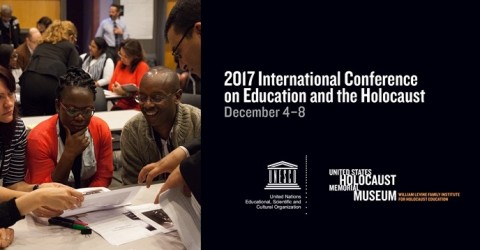
GCED Basic Search Form
Quick Search
当前位置
新闻

Thirty senior educators – from Argentina, Columbia, India, Indonesia, Kenya, Mexico, Namibia, South Africa, Tunisia, and Ukraine – will gather on 4-8 December 2017 in Washington D.C for the second bi-annual International Conference on Education and the Holocaust. The initiative is jointly organized by the United States Holocaust Memorial Museum (USHMM) and the United Nations Educational Scientific and Cultural Organization (UNESCO).
The main goal of the conference is to advance learning about why and how the Holocaust happened, as well as how genocide can happen. Participants will be organized into country teams of educators, civil society leaders, academics and education ministry officials. During the Conference, participants will design projects that help institutionalize or strengthen Holocaust education in ways relevant to their national contexts and subsequently implement them.
Participants will work together with international experts, in workshops and roundtables to devise strategies for Holocaust education. Project activities will consider curriculum development and revision, creation of educational materials, capacity-building initiatives, cultural projects, academic initiatives, and pedagogical research. USHMM and UNESCO will continue to support these country teams after the conference as they bring their projects to fruition.
Developing Holocaust education curricula
The inaugural 2015 conference included educators from Chile, Hungary, India, Lithuania, Mexico, Morocco, Namibia, Rwanda, Republic of Korea, and Turkey. Teams from these countries successfully developed Holocaust education curricula, hosted international conferences for educators, arranged for exhibitions on the Holocaust and genocide to be hosted in their countries, and more.
“The Holocaust was a watershed event with global implications, and its lessons are important for a global audience,” said Tad Stahnke, Director of the Initiative on Holocaust Denial and anti- Semitism at USHMM. “The Museum is working to support educators throughout the world who are trying to reach young people and key segments of society with critical lessons from the Holocaust in order to build a better future.”
“Through this conference, UNESCO wishes to advance Holocaust and genocide education and support in a broad sense the objectives of Education for Global Citizenship, a priority in regard to Sustainable Development Goal on Education,” said Karel Fracapane, UNESCO coordinator for the initiative. “Our objective is to make sure that education systems encourage critical thinking, and help learners become proactive citizens who reject racism, antisemitism and other forms of prejudice that can lead to group-targeted violence,” he added.
Education about the Holocaust
A living memorial to the Holocaust, USHMM inspires citizens and leaders to confront hate, prevent genocide, and promote human dignity. The Museum’s far-reaching educational programs and global impact are made possible by generous donors. For more information, visit ushmm.org.
UNESCO’s programme on education about the Holocaust and genocide is part of the Organization’s efforts to empower learners to become responsible and active global citizens who value human dignity and respect for all. For more information: https://en.unesco.org/themes/holocaust-genocide-education
The ICEH is supported by the Governments of Canada and Germany and by the SNCF.
For more information about the 2017 ICEH, please visit https://en.unesco.org/themes/holocaust-genocide-education/iceh-2017
Contact:
- Karel Fracapane k.fracapane@unesco.org
- Raymund Flandez rflandez@ushmm.org
